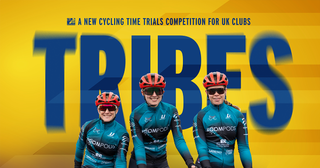If you don’t consider yourself a speed merchant but want to compete on a level playing field against anyone else in the country, your wishes might have been answered with a new competition, Tribes, from Cycling Time Trials.
Racing against the clock in the UK has a new look from today as the sport’s governing body takes the next step in addressing a decline in race entrants that had become a theme up to 2023.
Tribes has been launched by CTT in conjunction with results statistics platform Spindata, and it’s about as accessible as it gets.
To compete, riders need only take part in three events from a total of seven categories – short, medium, long, ultra, flat, hilly, and hill-climb.
Every open event between the beginning of February and the end of October falls into one or more of these categories, so you can enter any event you like – handy if you don’t fancy driving big distances to compete. Rides are entered automatically into the competition in one of four rider categories depending on whether you ride in the female or open category and ride a road bike or a non-road bike.
The new Tribes website, which has gone live Wednesday afternoon, can be viewed here.

(Image credit: Cycling Time Trials)
Unlike almost any other time trial competition, Tribes is not based on speed, or average speed. Rather, it’s based on finishing position in an event and how well you fared against your peers. So a slower ride on a windy course with grippy surfaces can compete with a faster ride on a flat course on a great day, and so on.
The latest race content, interviews, features, reviews and expert buying guides, direct to your inbox!
Points are awarded on this basis using Spindata’s statistical algorithms, which have already gained respect for being able to predict race finishing times pretty accurately.
“The Spindata points are agnostic to how fast the course is, how bad the weather was, whether you’re male or female… it makes no difference,” says CTT’s IT manager Roger Clarke. “The points you get are based purely on how well you ride on the day compared to the other people who were there and how good they are.”
With the idea being to get as many people time trialling as possible – whether new, existing or returning – this is very much a group effort, and you won’t be ranked in Tribes until there are three people from your club or team or group taking part in time trials.
If you’re the sole tester in your club, says Clarke, “Twist an arm in your club of someone who could ride a short, a flat and a medium, and you’ve got your tribe.”
He adds: “It’s really environmentally friendly and you don’t have to travel hundreds of miles to the fastest course and hope you get a float day, because you can ride your local hilly 13-mile event on an atrocious day, and if you do it really well compared to the other people, you’ll get rewarded for that.”
CTT chair Andrea Parish said the new competition was “all about future proofing, and bringing people along”, alluding to the fact that the traditional model of time trialling on fast dual carriageways has not been something upon which the sport is thriving any more.
“There will always be room for fast courses… but over 50% of our courses at the moment are non-standard distances, and they’re brilliant, and they’re quiet, and they’re suitable.
“[Tribes] is a way of getting people to hopefully think a little bit outside the box… to make it easier for organisers; to start popularising [sporting] coasters; get more people on road bikes, which for us has had a big impact. This is inclusion, not exclusion. It’s groundbreaking.”
At the end of the year, the winners in each category will be recognised not only in the rankings but will also be rewarded at the CTT Champions’ Lunch.

